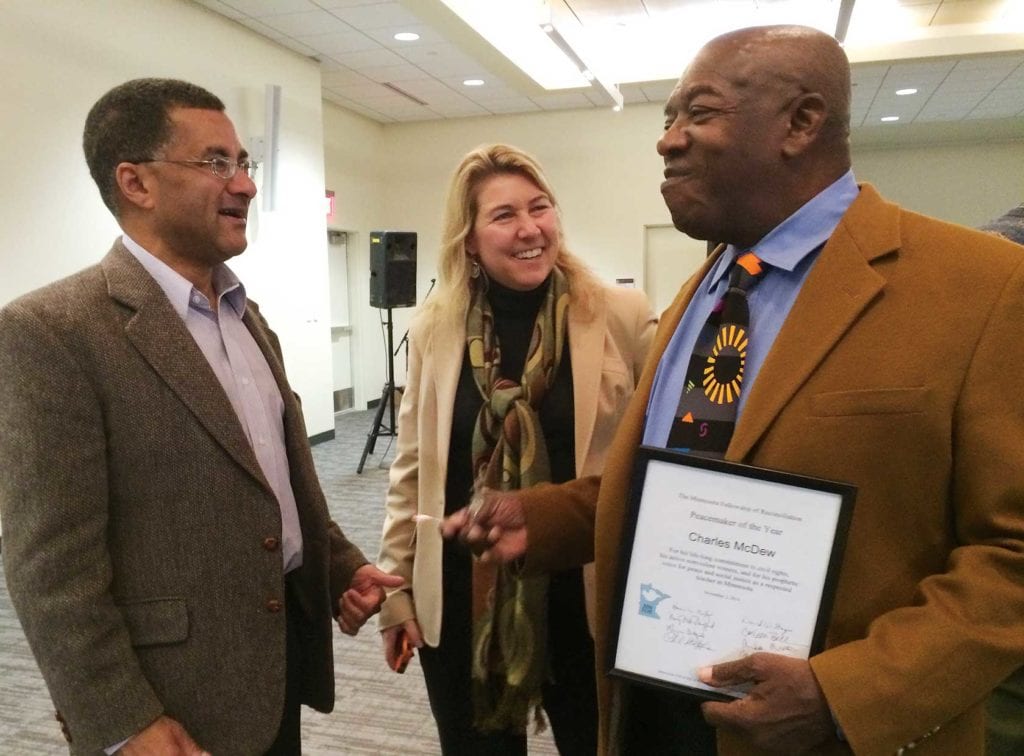
Charles McDew and I had a running joke, based on our shared geographies and worry for the country.
The national turmoil needs no explanation. The geographic reference is that my house in Duluth, Minnesota, is on the way to Canada from St. Paul, McDew’s home until his death on April 3 while visiting Newton, Mass.
The route north in Minnesota would be his escape if things got too intolerable. And if so, he promised to pick me up.
“Minnesota shares a border with Canada. The next time my fellow Americans get crazy I can walk!” he said of why he chose to live in a border state, recounted in the Civil Rights Movement book, “Toward the Meeting of the Waters.”
A chapter is devoted to McDew as a seminal figure in the struggle. And as a co-founder and the second chairman of the Student Nonviolent Coordinating Committee, or SNCC, McDew was easily the most prominent Jew in the movement.
If that line elicits a double-take, it’s supposed to — though at the same time it shouldn’t to anyone who recognizes that blacks and Jews are not mutually exclusive. Born in 1938 to an African American Christian family in Massillon, Ohio, at 14 he happened upon the Talmudic verse: “If I am not for myself who will be for me? But if I am only for myself, what am I? And if not now, when?” The words led him to become a Jew.
Or better, as fellow SNCC activist Bob Moses of Cambridge put it: “Black by birth, a Jew by choice and a revolutionary by necessity.”
That revolutionary spirit led him to fighting for African American rights after entering the historically black South Carolina State College in Orangeburg in 1959, as the Civil Rights Movement was gaining steam.
Deliberately violating Jim Crow laws in his first foray below the Mason-Dixon Line, McDew earned the attention of rights groups, including the founding meeting of SNCC in April 1960.
He left school to join SNCC full-time, working on voter registration in Mississippi and becoming its second chairman from 1960 to 1963. The period was the organization’s most dangerous, with the Ku Klux Klan targeting them, including the 1961 murder of local SNCC follower Herbert Lee.
McDew himself endured beatings and numerous arrests, including in Baton Rouge, Louisiana. There, guards taunted him to “say something communist.” “Kish mir in tuchas,” he reportedly responded.
Joyce Ladner, a SNCC worker and later a president of Howard University, said that despite all the terror, she recalled McDew’s “engaging manner that just cracked you up. Chuck could make you laugh out loud all the time.
“Also, he was known for his smile and when you saw him, you knew he would greet you with such genuine warmth.”
That’s exactly what I experienced at a 2014 tribute to him at Hamline University in St. Paul. Though we had corresponded, I mistakenly thought we had not before met in person — until he flashed that smile and related, in detail, an encounter we’d had in Boston years earlier.
It was then we agreed to hit Canada together. And if he had perfected his routine about bolting for the border, it was based on a real-life expatriate experience. A sobering 1993 Star Tribune account says he was pushed over the line by inaction of Attorney General Bobby Kennedy over the murders of three witnesses to Lee’s slaying, followed by overhearing “the drawl of two Southerners in the (Washington, D.C. airport) ticket line.”
“Right then I knew I’d hit the wall. It was time to go,” the newspaper quoted him.
He lived in Finland for a few years before returning to care for his parents, a 2010 Savannah Morning News article relates. He then worked in community development organizations in Washington, Cambridge, Massachusetts, Jacksonville, and Minneapolis, where beginning in 1981 he taught history at Metropolitan State University.
In living history, he may have been prescient: In an oral history on the Veterans of the Civil Rights Movement site (http://www.crmvet.org/nars/mcdew.htm), McDew states that SNCC’s founders originally thought of limiting the group’s life to five years. It lasted less than 10 before dropping the word “nonviolent” from its name and disbanding a few years later.
Ever the colorful storyteller — of true events — he was regaling SNCC Legacy Project attendees at Duke University just last month, said Ladner.
“He was in the best humor,” she said. “There’s a song SNCC folks sing as we depart called, ‘This may be the last time.’ I learned of his death when I got off a plane in Memphis, where I’d gone to commemorate the 50th anniversary of Dr. King’s death.”
It came during a yearly Passover visit to his longtime partner, Beryl Gilfix, in Newton, his daughter Eva Goodman said in a message. He is also survived by his brothers Eric and Mark McDew.
Reading my message about the Canada story, Goodman responded with an “LOL,” adding: “He was adamant about living near the border!”
Perhaps he just crossed a different one.
Former Banner managing editor Robin Washington splits his time between Minnesota and Massachusetts. He may be reached at robin@robinwashington.com or via Twitter @robinbirk






